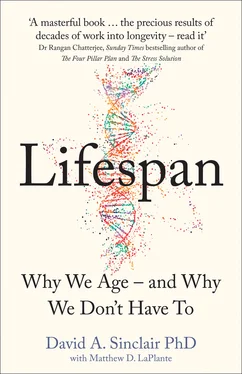Sirtuins aren’t the only longevity genes. Two other very well studied sets of genes perform similar roles, which also have been proven to be manipulable in ways that can offer longer and healthier lives.
One of these is called target of rapamycin, or TOR, a complex of proteins that regulates growth and metabolism. Like sirtuins, scientists have found TOR—called mTOR in mammals—in every organism in which they’ve looked for it. Like that of sirtuins, mTOR activity is exquisitely regulated by nutrients. And like the sirtuins, mTOR can signal cells in stress to hunker down and improve survival by boosting such activities as DNA repair, reducing inflammation caused by senescent cells, and, perhaps its most important function, digesting old proteins. 27
When all is well and fine, TOR is a master driver of cell growth. It senses the amount of amino acids that is available and dictates how much protein is created in response. When it is inhibited, though, it forces cells to hunker down, dividing less and reusing old cellular components to maintain energy and extend survival—sort of like going to the junkyard to find parts with which to fix up an old car rather than buying a new one, a process called autophagy. When our ancestors were unsuccessful in bringing down a woolly mammoth and had to survive on meager rations of protein, it was the shutting down of mTOR that permitted them to survive.
The other pathway is a metabolic control enzyme known as AMPK, which evolved to respond to low energy levels. It has also been highly conserved among species and, as with sirtuins and TOR, we have learned a lot about how to control it.
These defense systems are all activated in response to biological stress. Clearly, some stresses are simply too great to overcome—step on a snail, and its days are over. Acute trauma and uncontrollable infections will kill an organism without aging that organism. Sometimes the stress inside a cell, such as a multitude of DNA breaks, is too much to handle. Even if the cell is able to repair the breaks in the short term without leaving mutations, there is information loss at the epigenetic level.
Here’s the important point: there are plenty of stressors that will activate longevity genes without damaging the cell, including certain types of exercise, intermittent fasting, low-protein diets, and exposure to hot and cold temperatures (I discuss this in chapter 4). That’s called hormesis. 28Hormesis is generally good for organisms, especially when it can be induced without causing any lasting damage. When hormesis happens, all is well. And, in fact, all is better than well, because the little bit of stress that occurs when the genes are activated prompts the rest of the system to hunker down, to conserve, to survive a little longer. That’s the start of longevity.
Complementing these approaches are hormesis-mimicking molecules. Drugs in development and at least two drugs on the market can turn on the body’s defenses without creating any damage. It’s like making a prank call to the Pentagon. The troops and the Army Corps of Engineers are sent out, but there’s no war. In this way, we can mimic the benefits of exercise and intermittent fasting with a single pill (I discuss this in chapter 5).
Our ability to control all of these genetic pathways will fundamentally transform medicine and the shape of our everyday lives. Indeed, it will change the way we define our species.
And yes, I realize how that sounds. So let me explain why.
Конец ознакомительного фрагмента.
Текст предоставлен ООО «ЛитРес».
Прочитайте эту книгу целиком, купив полную легальную версию на ЛитРес.
Безопасно оплатить книгу можно банковской картой Visa, MasterCard, Maestro, со счета мобильного телефона, с платежного терминала, в салоне МТС или Связной, через PayPal, WebMoney, Яндекс.Деньги, QIWI Кошелек, бонусными картами или другим удобным Вам способом.












